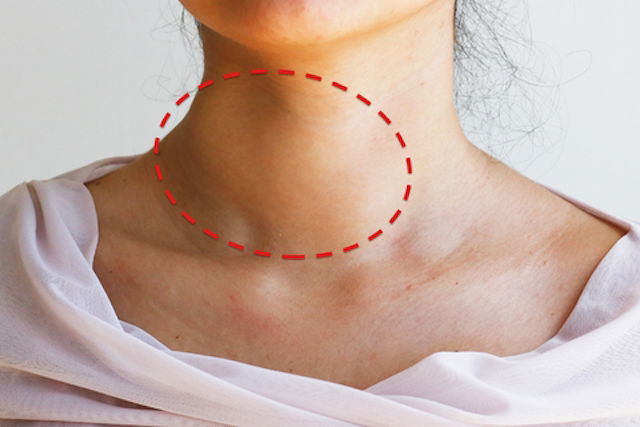A thyroid nodule is a small lump that appears in the neck region. It can cause symptoms like pain, swelling and/or a feeling of pressure in the area, which are more commonly experienced with large thyroid nodules.
Typically, a thyroid nodule is caused by cysts or excessive growth of normal thyroid gland cells, but when modules are very large or firm, they can be a sign of thyroid cancer.
Thyroid nodules should be assessed by an endocrinologist, who may advise ongoing monitoring of the nodule with ultrasounds, as well as medications, hormone therapy or even surgical removal as necessary.

Common symptoms
Some symptoms of a thyroid nodule may include:
- Palpable lump on neck
- Sore throat
- The feeling of swelling or pressure in the neck
- Difficulty breathing or swollowing
- Hoarseness or voice loss
Furthermore, some thyroid nodules produce thyroid hormones, and lead to high levels of T3 and T4,or hyperthyroidism,. Other nodules cause a deficiency of these hormones, which is known as hypothyroidism. Read more about thyroid tests and what results can mean.
However, it is common for thyroid nodules to not cause any symptoms. These are only identified during routine tests, like an ultrasound, for other conditions.
When to worry (about cancer)
A thyroid nodule may have specific characteristics that can increase its risk for being cancer. These include a nodule size greater than 4 cm, a hard or firm consistency, little mobility of the nodule, other lumps in the neck and hoarseness or voice changes-
Furthermore, the risk of a thyroid nodule being cancer is also higher in older people with a family history of thyroid cancer or a history radiation to the head and neck regions.
Confirming a diagnosis
The diagnosis of a thyroid nodule is made by an endocrinologist or family doctor. Assessment starts with a physical examination, in which the doctor palpates the neck, which is then followed by testing, like a thyroid ultrasound, which allows the nodule and its characteristics to be visualized.
Depending on the characteristics of the thyroid nodule, other tests may be indicated, such as fine needle aspiration (FNA), in which a sample of the nodule is collected and sent for analysis to confirm its benignity or malignancy.
What is the normal size of a thyroid nodule?
Thyroid nodules up to 1 cm in size can be considered normal in some cases. Depending on your ultrasound characteristics, other tests may be ordered for further evaluation, even if they are small.
When is a thyroid nodule considered to be large?
Although there is no specific limit, thyroid nodules larger than 2 cm may be considered large, and may trigger more testing to rule out the possibility of thyroid cancer.
Possible causes
Thyroid nodules can be caused by:
- Excessive growth of normal thyroid gland cells;
- Thyroid cyst;
- Chronic inflammation of the gland;
- Thyroid cancer.
Furthermore, the risk for thyroid nodules is greater when a patient has a history of radiation to the neck, obesity, smoking, metabolic syndrome and excessive alcohol consumption.
It is important that thyroid nodules are differentiated from other causes of lumps in the neck, such lymph nodes and lipomas, so that the most appropriate treatment can be indicated.
Also recommended: Lump on Side of Neck: 7 Common Causes (& What to Do) tuasaude.com/en/lump-on-side-of-neckTreatment options
Treatment of benign thyroid nodules may simply involve regular monitoring through ultrasound exams, which are normally ordered every 12 to 24 months, to assess whether the nodule is growing.
At any time, if the nodule develops suspicious characteristics of malignancy on ultrasound, a fine needle aspiration biopsy (FNA) may be ordered to rule-out the possibility of cancer.
Thyroid surgery to remove nodules is normally indicated in cases of malignant nodules or those that are larger than 4 cm and causing symptoms, such as neck pain and/or difficulty swallowing, due to the growth of the nodule. Read more about thyroid surgery and how to prepare.
Nodules that present with abnormal thyroid hormone levels, the doctor may recommend hormone replacement therapy or thyroid medication.
How can thyroid nodules affect pregnancy?
Women with thyroid nodules do not experience more difficulty than others. However a thyroid nodule during pregnancy can cause changes to hormone production, which may require treatment with medication to help regulate thyroid function. Abnormal thyroid functioning can cause cognitive or physical disabilities in babies.






























